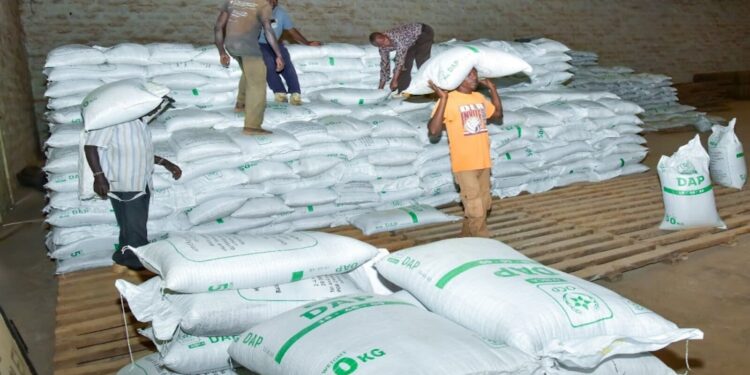The Kenyan government has reaffirmed its dedication to supporting farmers across the country by ensuring the timely distribution of subsidized fertilizer ahead of the long rains and planting season. This initiative, spearheaded by President William Ruto’s administration, aims to enhance agricultural productivity, ensuring food security and economic stability for millions of Kenyans. Farmers in various regions have welcomed this support, citing reduced production costs and increased access to essential farm inputs.
In Thika Sub-County, Kiambu County, for example, farmers expressed relief following the arrival of subsidized fertilizer at the National Cereals and Produce Board (NCPB) depot. The Administration Secretary at the State Department of Agriculture, Rashid Khator, visited the depot, where he assured farmers of the government’s commitment to a smooth and efficient distribution process. He emphasized that no farmer would be left behind in accessing the much-needed farm input, as the government continues to strengthen last-mile delivery mechanisms.
Khator highlighted the government’s proactive approach in expanding farmer registration to match the increasing demand for fertilizer. Additionally, strict measures have been put in place to prevent the circulation of counterfeit products in the market. To further support farmers, the government has partnered with Kenya Seed Company to ensure that quality seeds are available in all regions, bolstering agricultural production.
Farmers in Thika lauded the government for the timely availability of fertilizer at affordable prices. Many noted that the subsidy had significantly eased their financial burden, enabling them to expand their cultivated acreage. John Mwangi, a farmer from Gatuanyaga, expressed his satisfaction with the program, stating, “I am happy that I don’t have to deal with brokers who hike prices. The fertilizer is affordable and easily accessible at the depot.”
The success of the fertilizer subsidy program has been instrumental in Kenya’s journey toward food security. Since its inception under President Ruto’s administration, the country has witnessed an increase in agricultural yields, eliminating the need for maize imports. This shift marks a significant milestone, as Kenya has historically relied on external maize supplies to meet local demand. The government’s efforts in stabilizing the agricultural sector are not only benefiting farmers but also reducing the overall cost of food for consumers.
Similarly, Siaya County has also joined the government’s push to enhance food production by procuring 72 tons of fertilizer for distribution at subsidized rates. In addition to fertilizer, the county government has acquired 40 tons of maize seed, which will be distributed to farmers across the six constituencies. Sylvester K’okoth, the County Executive Committee Member for Agriculture, stated that 10,500 farmers are set to benefit from the initiative, which aims to increase food production and ensure sustainability.
The Siaya County government has allocated approximately Sh30 million toward the subsidy program this financial year. Farmers can access certified maize seeds at Sh400 per two-kilogram packet and top-dressing fertilizer at Sh600 per 10-kilogram bag. The program also includes the distribution of three tons of sorghum seeds and 2.5 tons of green gram seeds to diversify agricultural output and promote resilience against climate change.
Across the country, farmers have continued to commend the government’s efforts, citing the fertilizer subsidy as a game-changer in the agricultural sector. The subsidy has allowed smallholder farmers to increase their productivity, contributing to surplus yields and reducing reliance on expensive imports. The recent arrival of 20,000 metric tonnes of fertilizer at the port of Mombasa further underscores the government’s commitment to maintaining a steady supply.
At a subsidized price of Sh2,500 per 50kg bag, farmers are now accessing fertilizer at a significantly lower cost compared to the market rate of Sh6,500. This pricing model is designed to alleviate financial pressure on farmers, ensuring that they can cultivate their land without excessive input costs. The government’s fertilizer subsidy program remains a critical pillar in the broader agenda of lowering food production costs and enhancing food security nationwide.
As Kenya moves toward self-sufficiency in food production, the subsidized fertilizer program continues to play a pivotal role in empowering farmers and fostering agricultural growth. The success of this initiative highlights the importance of strategic government interventions in ensuring that farmers receive the necessary support to maximize yields. With ongoing efforts to streamline distribution and prevent shortages, the government remains steadfast in its mission to make Kenya food secure and economically resilient.










